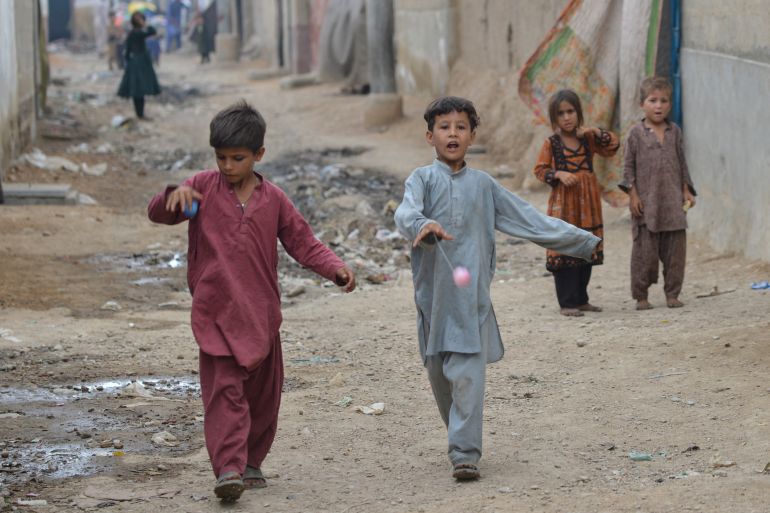Pakistan’s plan to evict thousands of Afghans ‘unacceptable’, says Taliban
The Taliban says Afghan citizens were not to blame for Pakistan’s security problems.

Pakistan’s plan to evict hundreds of thousands of Afghan refugees and migrants is “unacceptable”, says the Taliban, denying Islamabad’s allegations that Afghanistan’s citizens were responsible for Pakistan’s security problems.
“The behaviour of Pakistan towards Afghan refugees is unacceptable,” Zabihullah Mujahid, spokesman for the Taliban administration in Kabul, said in a post on the social media platform X, formerly known as Twitter, on Wednesday.
Keep reading
list of 4 items‘Mourning in every street’: A Pakistani city, crushed by a suicide bomb
Dozens dead after Pakistan rocked by bombings in two provinces
How is Pakistan dealing with the security threat from Afghanistan?
“Afghan refugees are not involved in Pakistan’s security problems. As long as they leave Pakistan voluntarily, that country should tolerate them,” he said.
Around one million Afghans are registered as refugees in Pakistan and 880,000 more have legal status to remain, according to the latest United Nations figures.
But Pakistan’s caretaker government on Tuesday said a further 1.73 million Afghans were living in Pakistan without any legal status, and set a November 1 deadline for them to leave or face expulsion.
In a statement shared with Al Jazeera, rights group Amnesty International on Wednesday urged Pakistan to continue its “historic support” for Afghan refugees by enabling them to live with dignity and free from the fear of deportation to Afghanistan.
“They are living incredibly precarious lives where they are either having to undergo arduous processes for registering as refugees in Pakistan; or are stuck in lengthy processes waiting to obtain relocation to another country. A forced return to Afghanistan could put them at grave risk,” it said.
Amnesty called on the United Nations High Commission for Refugees (UNHCR) to expedite registration and reviews of applications from Afghans seeking international protection in Pakistan and asked Pakistan to stop the crackdown against the refugees.
Tensions between neighbours
Afghans have migrated to neighbouring Pakistan over decades of conflict during the Soviet invasion, the following civil war and the United States-led occupation. Nearly 600,000 Afghans have arrived since the Taliban seized power in Kabul in 2021.
Taliban authorities have been trying to tempt back those who left, despite the nation suffering from a massive scaleback of aid following the collapse of the US-backed government.
To justify its crackdown, Pakistan’s caretaker Interior Minister Sarfraz Bugti alleged that Afghan nationals had carried out 14 out of 24 suicide bombings in Pakistan this year.
The Taliban rejected the charge.
“We deny all these claims because Afghans have migrated to other countries for their safety, their security,” said Abdul Mutalib Haqqani, spokesman for the Afghan Ministry of Refugees and Repatriation.
“It’s natural when someone migrates to another country for his safety, he would never want insecurity there,” he told AFP news agency.
Pakistan’s ultimatum to the migrants, most of whom have been living in the country for years, came after a meeting of civil and military leaders to review the law-and-order situation following two suicide bombings on Friday that killed at least 57 people.
Bugti said one of the suicide bombers was an Afghan national, and he also accused India’s intelligence agency of involvement.
Relations between the Taliban and the Pakistan government have deteriorated markedly, with border clashes temporarily closing the main trade route between the neighbours last month.
Islamabad alleges that armed groups use Afghan soil to train fighters and plan attacks inside Pakistan. The Taliban denies the accusation, saying Pakistan’s security problems are home-grown.
A caretaker government was installed in August to guide Pakistan through to elections expected sometime in the coming months, and the military has been able to exert more influence as a result of the uncertainty and instability in the country.